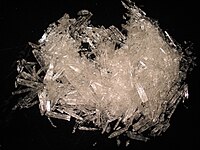
Photo from wikipedia
Abstract Context Curcumin, the active component of Curcuma longa L. (Zingiberaceae), exhibits a wide variety of biological activities including vasodilation and anti-inflammation. Objective The relaxant effect of curcumin in tracheal… Click to show full abstract
Abstract Context Curcumin, the active component of Curcuma longa L. (Zingiberaceae), exhibits a wide variety of biological activities including vasodilation and anti-inflammation. Objective The relaxant effect of curcumin in tracheal smooth muscle (TSM) was not examined so far, thus, this study was designed to assess the relaxant effect of curcumin on rat TSM and examine the underlying mechanism(s) responsible for this effect. Materials and methods TSM was contracted by KCl (60 mM) or methacholine (10 μM), and cumulative concentrations of curcumin (12.5, 25, 50, and 100 mg/mL) or theophylline (0.2, 0.4, 0.6, and 0.8 mM, as positive control) were added to organ bath. The relaxant effect of curcumin was examined in non-incubated or incubated tissues with atropine (1 μM), chlorpheniramine (1 μM), indomethacin (1 μM), and papaverine (100 μM). Results In non-incubated TSM, curcumin showed significant relaxant effects on KCl-induced contraction in a concentration-dependent manner (p < 0.001 for all concentrations). The relaxant effects of curcumin 12.5, 25, and 50 mg/mL were significantly lower in atropine-incubated tissue compared to non-incubated TSM (p < 0.05 to p < 0.001). A significant difference was observed in EC50 between atropine-incubated (48.10 ± 2.55) and non-incubated (41.65 ± 1.81) tissues (p < 0.05). Theophylline showed a significant relaxant effect on both KCl and methacholine-induced contraction in a concentration-dependent manner (p < 0.001 for all cases). Conclusions The results indicated a relatively potent relaxant effect of curcumin on TSM, which was less marked than the effect of theophylline. Calcium channel blocking and/or potassium channel opening properties of curcumin may be responsible for TSM relaxation.
Journal Title: Pharmaceutical Biology
Year Published: 2020
Link to full text (if available)
Share on Social Media: Sign Up to like & get
recommendations!